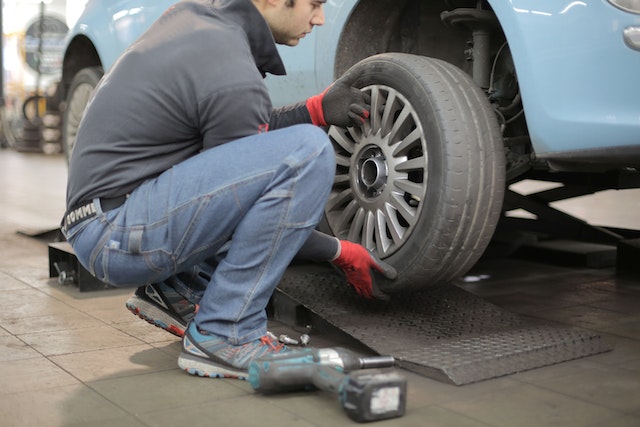A normal set of tires should last for 60,000 to 75,000 miles, or around four to five years, although this may vary depending on key factors such as tire quality and type. For example, family-car tires generally last longer than ultra-high performance tires, while all-season, summer and winter tires will have different tread ratings and lifespans. Regardless of what type of tires you choose, you can optimize their performance and durability with a few weekly checks.
Consider where you drive
Potholes, debris, and other road hazards can cause tire damage. Stay vigilant while driving and try to avoid hitting potholes or driving over sharp objects whenever possible. If you do encounter a pothole, inspect your tires afterward for any signs of damage. If you have a choice, avoid roads that are full of potholes or large ruts, opting for smooth, even surfaces. Minimize your driving on dirt or loose gravel roads, and do not park too close to curbs. This can rub tread off the outside wall of your tires or the sidewall, which can cause a tire to blow out while driving.
Drive smoothly
Your personal driving style has a large impact on the wear and durability of your tires. To optimize performance, accelerate and brake gently, aim for smooth gear changes, and take turns slowly. Practice defensive driving techniques, maintaining a safe distance from the vehicle ahead of you. These small changes will prevent unnecessary wear to your tires and increase their longevity.
Avoid overloading
Excessive weight can strain your tires and reduce their lifespan. Be mindful of your vehicle’s load capacity and avoid overloading it. Check the manufacturer’s guidelines for the maximum load rating and avoid exceeding it.
Ensure your tires are properly inflated
Keeping your tires properly inflated is a simple, effective way to increase their lifespan. Inflate them to the recommended pressure, which you can find in your owner’s manual or on the sticker located on the driver’s side door jamb. A reliable tire pressure gauge can help you check and adjust the pressure regularly.
Maintaining your car’s correct tire pressure is vital, as underinflated tires can cause increased rolling resistance, reduced fuel efficiency, and uneven wear. On the other hand, overinflated tires can lead to a harsh ride, decreased traction, and increased risk of a blowout. Check your tire pressure weekly and adjust accordingly, as tire pressure varies as weather and other environmental conditions shift.
Keep the suspension system in good shape
If your car pulls left or right when you steer, or if the car shakes when you hit a bump, you might have a problem with your suspension system. A vehicle’s suspension system contributes greatly to tire wear, and a misalignment can cause your tires to wear quickly and unevenly, usually requiring replacement.
Your mechanic can perform an alignment check to diagnose the problem. While suspension problems can be expensive, they will ultimately make your ride more comfortable and help your tires to last longer.
Rotate your tires
If your suspension system has any problems, your tire treads can wear unevenly. You can mitigate this risk by rotating your tires on a regular basis. Most tire manufacturers recommend rotating your tires every other time you change your oil, which equals to roughly once every 6,000 miles. While some manufacturers may recommend rotating your tires every six months, this might not be sufficient to prevent uneven wear on a high-mileage vehicle.
Most car owners adopt a four-tire rotation schedule, which involves rotating just the tires on the vehicle. To determine the precise rotation pattern, check your owner’s manual; different patterns are optimal for four-wheel drive, front-wheel drive, and all-wheel drive vehicles. Alternatively, ask your mechanic to rotate your tires every other time you take the car in for an oil change.
If your vehicle has a full-size spare tire, you might consider working it into the rotation. A five-tire rotation ensures that your spare is always in good shape and might even allow you to use it for an extended period of time, if necessary.
Balance your wheels
Along with tire rotation, ask your mechanic to balance your wheels. Even when they are brand new, tires and wheels have a heavy spot, which your mechanic can measure in one-quarter and one-half ounces. These heavy spots can cause vibrations and uneven tire wear. If your mechanic detects a heavy spot, they can use a specialized machine and small weights to balance the wheels. This easy, straightforward process can substantially extend your tires’ life.
Keep your tires clean
Regularly clean your tires to remove dirt, grime, and brake dust. Use a mild detergent and a soft brush to gently scrub the tires. Avoid using harsh chemicals or abrasive brushes that can damage the tires’ surface.
Properly store your tires
If you have seasonal tires or a spare set, proper storage is essential. Keep them in a cool, dry place away from direct sunlight and sources of heat. Store them upright or
suspended to prevent deformation. Before reinstalling stored tires, inspect them for any signs of damage or deterioration.
